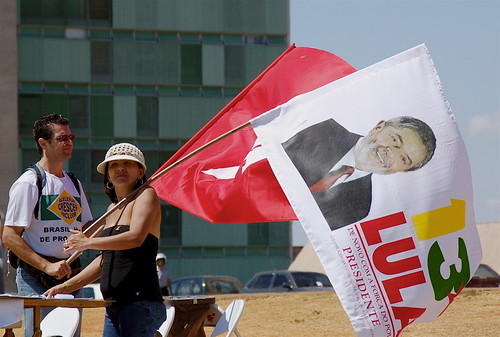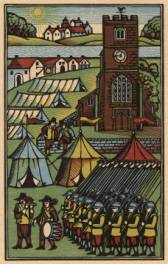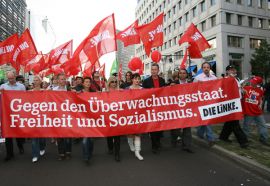By Nigel Gibson and Raj Patel
October 8, 2009 -- Pambazuka News -- You don’t need presidential palaces, or generals riding in tanks, or even the CIA to make a coup happen. Democracy can be overthrown with far less pomp, fewer props and smaller bursts of state violence. But these quieter coups are no less deadly for democracy.
At the end of September 2009, just such a coup took place in South Africa. It wasn’t the kind involving parliament or the inept and corrupt head of the African National Congress (ANC) Jacob Zuma. Quite the opposite. It involved a genuinely democratic and respected social movement, the freely elected governing committee of the shack settlement at Kennedy Road in Durban. And this peaceful democracy was overthrown by the South African government.
Workers Party of Brazil: The different strategies of the Latin American left

By Valter Pomar, secretary of international relations, Workers’ Party (PT) of Brazil
October 10, 2009 -- It has become commonplace to say that there are two lefts in Latin America: one would be “carnivore”, the other “vegetarian”; one would be radical, the other moderate; one would be revolutionary, the other reformist; one would be socialist, the other capitalist.
Dichotomous definitions of this kind are made by spokespersons (official or unofficial) of the US State Department, with the explicit purpose of bringing about discord in the Latin American left, making it fight itself rather than its common enemies.
CPI (ML) Liberation: Cooperation, not confrontation, should be the basis of India's China policy

The Levellers and the 1640s English Revolution

By Graham Milner
In 1649, 360 years ago this year, an experiment in communal land holding and cultivation began on St. George's Hill in Surrey, England, as the principles of a communist society were put into practice by the Diggers -- followers of Gerrard Winstanley, a visionary and writer of radical political tracts. This experiment marked an important phase in the development of socialist tendencies in the struggle to defeat the Stuart monarchy in the 1640s. This essay attempts to analyse the dynamics of the revolutionary struggle in England during the 1640s civil war and its aftermath. It concentrates on the emergence and development of left-wing tendencies in the revolutionary movement, and attempts to provide an explanation for the defeat of the aspirations of those tendencies.
Positive developments in the European left

By Ian Angus
Philippines socialists: `Moratorium on foreign debt to pay for a modern weather forecasting service'
Scenes from Manila in the aftermath of Typhoon Ondoy. Photos: Vitamin OC.
By Partido Lakas ng Masa
Moratorium on foreign debt servicing to pay for essential and basic services! Upgrade Pagasa’s equipment now!
Thailand: Comparing the 1976 and 2006 coups
By Giles Ji Ungpakorn
Honduras: Interview with Juan Barahona, leader of the National Resistance Front Against the Coup
Juan Barahona. Photo: Telesur.
By Pedro Fuentes, Tegucigalpa
October 1, 2009 -- “We will not stop. We will continue to be against the coup until the last day they are in power,” Juan Barahona said in an interview at the headquarters of STYBIS, the beverage workers’ trade union. Barahona is the principal leader of the resistance, together with Carlos Reyes, president of the trade union, a close comrade of Barahona and an independent candidate for the next presidential election. Reyes is injured and cannot participate, which makes Juan appear to be most visible face of the resistance.
Germany: Big gains for Die Linke as Social Democrats’ support collapses

By Duroyan Fertl
October 5, 2009 – Germany’s ``centre-right’’ Chancellor Angela Merkel was returned to power in federal elections held on September 27, but with a record low voter turnout and an increased vote for the far-left party, Die Linke (The Left).
The election was a clear success for Merkel and her Christian Democratic Union (CDU). Her preferred coalition partner – the free-market fundamentalist Free Democratic Party (FDP) – increased its support by 4.8 per cent to an all-time high of 14.6 per cent, enough to form a CDU-FDP government. The FDP will now replace the CDU’s main rival – the ``centre-left’’ Social Democratic Party (SPD) – as coalition partner in the government of Europe’s largest economy.
At the same time, the SPD’s support collapsed by more than 6 million votes, dropping a massive11.2 per cent to only 23 per cent – its worst result since World War II. As one leading SPD member pointed out on election night, “We have been bombed back into the Weimar Republic”. SPD leader Walter Steinmeier described the result as “a bitter day” for German social democracy.
Honduras: The threat of a Haiti-style foreign military occupation

By Ricardo Arturo Salgado
Tegucigalpa, September 27, 2009 –- Socialist Voice –- The Honduras crisis has sparked great interest among thinkers of both right and left up and down the continent. Many people are reflecting on events, using all the analytical tools their knowledge permits. There is wide scope for speculation, mainly because – for most people – the actions of different forces have been so unexpected in character.
President Manuel Zelaya carried out his return to Honduras in a way that astonished everyone, both the coup makers and most of his followers (myself included). Of course, the countries that are said to have participated in the operation do all they can to deny prior knowledge of his trip.
Venezuela plans deeper popular democracy to address economic crisis
By Federico Fuentes, Caracas
September 24, 2009 -- Faced with the growing impact of the global economic crisis, Washington’s intentions to establish seven military bases in Colombia and growing challenges in solving structural problems, Venezuelan President Hugo Chavez reaffirmed the need to build a new state.
“We have inherited a capitalist state that serves the interests of the bourgeoisie and is still penetrated by interests contrary to the revolution. We need to carry out an internal shake up of the government structures”, Chavez said on September 19 during the second expanded council of ministers meeting, which also involved governors and mayors aligned with the Bolivarian revolution.
The meeting was called to discuss a series of new measures the revolutionary government plans to announce in coming weeks to confront some of the challenges it faces on the economic, political and social fronts. In all, 54 new measures have already been approved by his cabinet.
Global economic crisis
New figures released by the Central Bank of Venezuela (BCV) showed the national economy contracted by 1% in the first half of the year, including a 2.4% drop in the second quarter.
(Updated Oct. 6) On the spot in Honduras: The people are still on the streets!

Honduras, September 30, 2009.
* * *